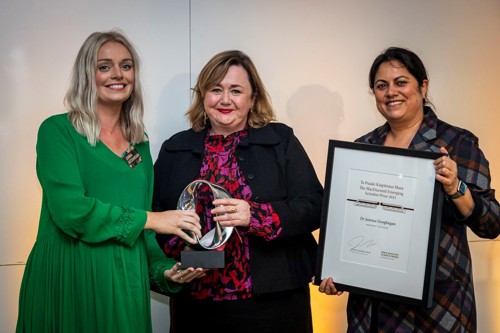Prestigious awards recognise the work of MWC investigators
MWC Principal and Associate Investigators were awarded international and national recognition for their scientific research and engagement with the community.

Dr Jemma Geoghegan with Hon Dr Megan Woods and Hon Dr Ayesha Verrall
In mid-2022, Dr Jemma Geoghegan, won the 2021 Te Puiaki Kaipūtaiao Maea Prime Minister’s MacDiarmid Emerging Scientist Prize for work investigating how viruses jump to new hosts, then emerge, evolve, and spread in space and time. Dr Geoghegan is one of the scientists behind New Zealand’s COVID-19 genome sequencing programme and her efforts to better understand this “evolutionary arms race” have impacted all New Zealanders.
Dr Geoghegan is part of the MWC-funded ‘Real time pathogen genomics for diagnostics and surveillance in the Pacific Islands’ research project (see page 717).
The Rutherford Discovery Fellow at the University of Otago and ESR scientist is only the second woman to have won the Prize worth $200,000 which she hopes to use to inspire more women into science, build capability in the area of infectious disease, and explore viruses in nature and better understand their ecology and evolution.
Fellow University of Otago colleague, Professor Michael Baker received the 2022 Callaghan Medal, Royal Society of New Zealand Te Apārangi for his science-informed commentary on the Covid-19 pandemic and other major public health issues.
The 2022 Hector Medal, Royal Society of New Zealand Te Apārangi was awarded to Massey University’s Professor Murray Cox for his major advances in population genetic theory together with new computational methods providing great insight into genome evolution.
Cancer immunology investigators from the North and South have been recognised for their longstanding contributions to the scientific community.
Professor Mark Hampton, from the University of Otago, won the NZ Society for Biochemistry and Molecular Biology Award for Research Excellence. His work investigates the intriguing way cells sense and respond to oxidants and how these pathways might be modulated to prevent and treat human disease. His present research looks at how oxidants regulate epigenetic and cell death pathways, how disrupting redox homeostasis can help kill cancer cells and pathogenic microbes, and how oxidative stress is associated with the biological processes underlying human ageing.
University of Auckland based Professor Cristin Print, has received the prestigious New Zealand Society for Oncology (NZSO) Translational Award for his work cultivating partnerships, connecting scientists with clinicians, and Māori and non-Māori across the cancer field.
Also in cancer immunology, Associate Professor Aniruddha Chatterjee was awarded The Roche Translational Cancer Research Fellowship Award (NZSO 2021), alongside Dr Rajiv Kumar, to upskill and translate his research on better understanding of the mechanism of disease in cancer into clinical practice. Chatterjee lab is using cutting edge next-generation sequencing, computational analysis, and experimental work to decipher the role of epigenetic modification, focusing on DNA methylation in disease, particularly in cancer.
Further afield, Distinguished Professor Dame Margaret Brimble, MWC Director, has received international acclaim with the 2022 Pedler Award by the Royal Society of Chemistry (RSC) recognising her lifetime work in organic chemistry and, announced in 2022, the 2023 Ernest Guenther Award in the Chemistry of Natural Products from the American Chemical Society recognises her outstanding achievements in the analysis, structure elucidation, and chemical synthesis of natural products.